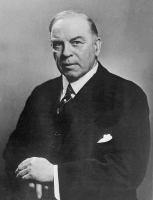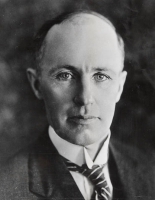| 出生地: | 加拿大安大略省柏林 | ||||||
| 去世地: | 加拿大魁北克省切尔西 | ||||||
| 陵墓: | 安大略省多伦多快活山墓园 | ||||||
| |||||||
威廉·莱昂·麦肯齐·金,PC,OM,CMG(William Lyon Mackenzie King,1874年12月17日-1950年7月22日),是第11、13及15任加拿大总理。
金于1919年加入了自由党,在第一次世界大战期间由于另一个政党的掌舵失利,他成功统一了自由党,并在1921年的选举中取得了胜利。他的政党在1930年至1935年大萧条最严峻的日子里并未执政。但他在经济好转之后又赢得了大选。他亲自处理了与草原三省的复杂关系,而他的高级助手厄内斯特·拉普安特(Ernest Lapointe)和路易·圣洛朗(Louis St. Laurent)巧妙地满足了法裔加拿大人的要求。
在第二次世界大战期间,他小心翼翼地成功避免了由于加拿大的征兵危机,爱国主义和种族矛盾产生的分裂运动。尽管他在位期间没有进行重大的政策创新,但他却能够综合并通过一系列已经达到国家广泛支持水平的政策来获得不小的成效。学者们认为金之所以能长期担任自由党的领袖,是因为他的技能范围广泛,最为适合加拿大的需要。他了解劳资关系。他能敏锐地察觉到公共政策的细微差别,而且他是一个精明而深入的智力工作者,并对加拿大社会的复杂性有着深刻的理解。金是一个把管理与调解视为工业社会必不可少的现代化技术专家,他希望自由党能代表自由主义来创造社会和谐。金以政策和政府的行动为手段,为许多不稳定的因素带来了妥协和和谐。他领导了他的政党(自由党)长达29年,确立了加拿大作为一个完全致力于维护世界秩序的中坚的国际声誉。
1908年应洛里埃之邀担任了洛里埃内阁中的劳工部长。1911年自由党竞选失败后,金暂时离开政界,研究劳资关系。1919年洛里埃去世以后,金出任自由党领袖职务。他在1921年至1926年、1926年至1930年、1935年至1948年三度担任加拿大总理,在位时间长达21年,是英联邦王国历史上在位时间最长的一位总理。
1999年,麦肯齐·金被历史学家评选为最伟大的加拿大总理;他的肖像现被印在加币50元纸钞上。
金的早年生活,所信仰的宗教与他的家庭
麦肯齐私下对巫术、神秘学与灵修很感兴趣。他曾尝试用水晶球与达芬奇、威尔弗里德·劳雷尔、富兰克林·罗斯福、麦肯齐的家庭成员及他死去的狗的灵魂沟通。他从未结婚。
外部链接
William Lyon Mackenzie King OM CMG PC (December 17, 1874 – July 22, 1950), commonly known as Mackenzie King, was the dominant Canadian political leader from the 1920s through the 1940s. He served as the tenth prime minister of Canada in 1921–1926, 1926–1930 and 1935–1948. He is best known for his leadership of Canada throughout the Second World War (1939–1945) when he mobilized Canadian money, supplies and volunteers to support Britain while boosting the economy and maintaining morale on the home front. A Liberal with 21 years and 154 days in office, he was the longest-serving prime minister in Canadian history. Trained in law and social work, he was keenly interested in the human condition (as a boy, his motto was "Help those that cannot help themselves"), and played a major role in laying the foundations of the Canadian welfare state.
King acceded to the leadership of the Liberal Party in 1919. Taking the helm of a party bitterly torn apart during the First World War, he reconciled factions, unifying the Liberal Party and leading it to victory in the 1921 election. His party was out of office during the harshest days of the Great Depression in Canada, 1930–35; he returned when the economy was on an upswing. He personally handled complex relations with the Prairie Provinces, while his top aides Ernest Lapointe and Louis St. Laurent skillfully met the demands of French Canadians. During the Second World War, he carefully avoided the battles over conscription, patriotism and ethnicity that had divided Canada so deeply in the First World War. Though few major policy innovations took place during his premiership, he was able to synthesize and pass a number of measures that had reached a level of broad national support. Scholars attribute King's long tenure as party leader to his wide range of skills that were appropriate to Canada's needs. He understood the workings of capital and labour. Keenly sensitive to the nuances of public policy, he was a workaholic with a shrewd and penetrating intelligence and a profound understanding of the complexities of Canadian society. A modernizing technocrat who regarded managerial mediation as essential to an industrial society, he wanted his Liberal Party to represent liberal corporatism to create social harmony. King worked to bring compromise and harmony to many competing and feuding elements, using politics and government action as his instrument. He led his party for 29 years, and established Canada's international reputation as a middle power fully committed to world order.
King's biographers agree on the personal characteristics that made him distinctive. He lacked the charisma of such contemporaries as Franklin Roosevelt, Winston Churchill, or Charles de Gaulle. He lacked a commanding presence or oratorical skill; his best writing was academic, and did not resonate with the electorate. Cold and tactless in human relations, he had many political allies but very few close personal friends. He never married and lacked a hostess whose charm could substitute for his chill. He kept secret his beliefs in spiritualism and use of mediums to stay in contact with departed associates and particularly with his mother, and allowed his intense spirituality to distort his understanding of Adolf Hitler throughout the late 1930s.
A survey of scholars in 1997 by Maclean's magazine ranked King first among all Canada's prime ministers, ahead of Sir John A. Macdonald and Sir Wilfrid Laurier. As historian Jack Granatstein notes, "the scholars expressed little admiration for King the man but offered unbounded admiration for his political skills and attention to Canadian unity." On the other hand, political scientist Ian Stewart in 2007 found that even Liberal activists have but a dim memory of him.
| << 前一君主: 阿瑟·米恩 | 20世纪早期威廉·莱昂·麦肯齐·金 William Lyon Mackenzie King (1921年~1926年) | 后一君主 >>: 阿瑟·米恩 |
| << 前一君主: 阿瑟·米恩 | 20世纪早期威廉·莱昂·麦肯齐·金 William Lyon Mackenzie King (1926年~1930年) | 后一君主 >>: 理查德·贝德福德·贝内特 |
| << 前一君主: 理查德·贝德福德·贝内特 | 20世纪早期威廉·莱昂·麦肯齐·金 William Lyon Mackenzie King (1935年~1948年) | 后一君主 >>: 路易·斯蒂芬·圣洛朗 |

